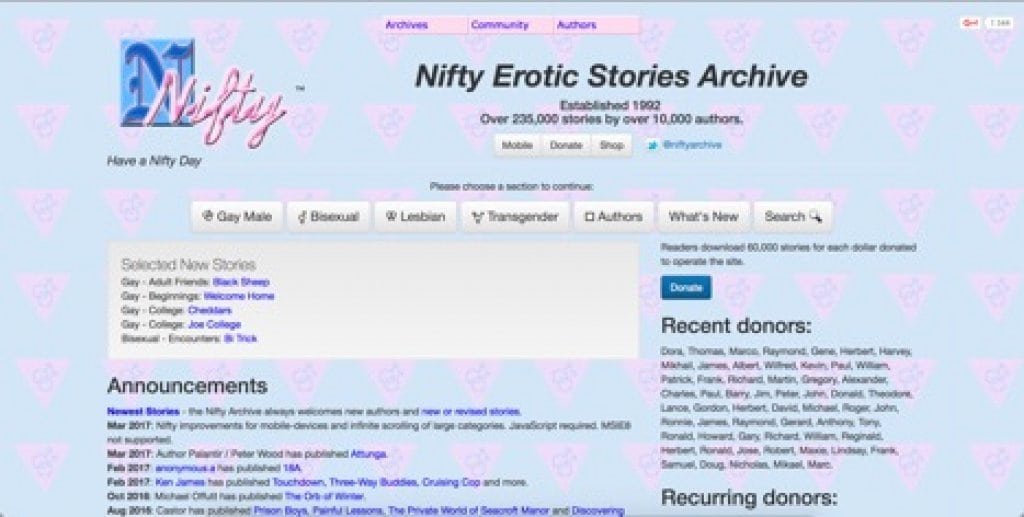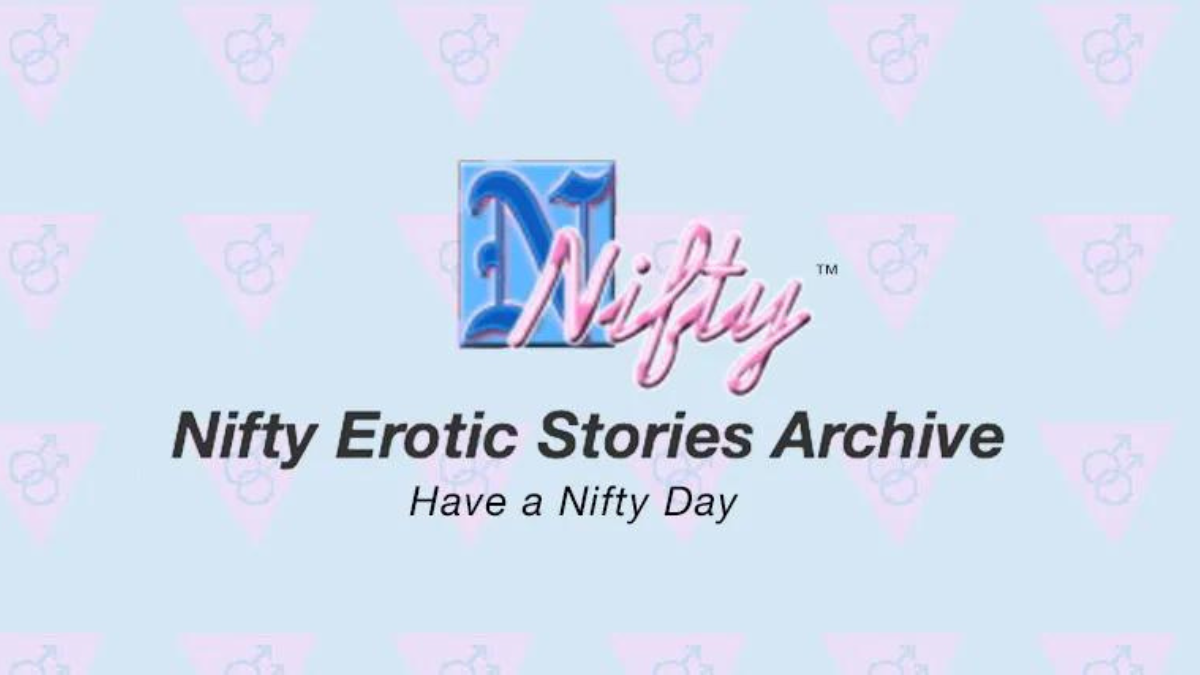Could a digital library of explicit stories truly be a beacon of liberation for a community, or is it merely a reflection of the ever-evolving nature of the internet and its capacity for both connection and exploitation? For over three decades, the "nifty archive" has been a prominent, albeit controversial, presence in the digital landscape, hosting a vast and freely accessible collection of gay male erotic stories.
The sheer scale of the "nifty archive" is undeniable. Since its inception in 1992, it has amassed a library exceeding 178,000 stories, a testament to the enduring human fascination with storytelling and the specifics of desire. The archive's stated mission has been to provide a platform for uncensored expression, offering authors and readers alike a space to explore themes often marginalized or suppressed in mainstream media. However, the nature of the content, the financial model, and the overall ethical implications of the project have generated significant debate and critical examination within the LGBTQ+ community and beyond. There's the question of accessibility and the responsibility that comes with it. Does unrestricted access to explicit material truly empower individuals, or does it open the door to potential harm and exploitation? The archive's longevity, its appeal, and the ongoing discussions around it reflect the complex ways in which desire, community, and technology intertwine in the digital age.
The core offering of the "nifty archive" has always been its collection of gay male erotic stories. This has been presented as the largest free and open repository of such stories globally. But it's important to acknowledge this content includes a wide range of subgenres, from stories of relationship between gay men to others that feature relationships among family members, including siblings and mothers. The stories also frequently delve into the realms of bondage, control, domination, and S&M and BDSM practices.
- Msg Capacity How Many People Fit Answers Info Google Discover
- Brian Oconners Legacy In Fast Furious Still Alive
The archive has always been clear about its mission to offer a space for this kind of content, but the archive relies on community support to keep the platform functioning. Users are frequently reminded of this, with pleas for financial contributions. It is this element, that has raised questions regarding the financial sustainability of the archive and the ethical implications of its operation. The website, with its new and updated stories, has always worked on the model of reader donations. The site's longevity depends on continued support.
Here is a simple table with the archive's Search engine details:
| Category | Search Count (Example) |
|---|---|
| Gay Male | 68547 |
| Bisexual | 7182 |
| Lesbian | 6683 |
| Transgender | 5200 |
| Bestiality | 1029 |
The archive also features links to other resources and collections. It is an evolving collection, constantly updated. It would appear the archive has experienced some setbacks during its life. In times of need, the site has been upgraded with a new search engine with a 'beta' version available. A new search engine, that can be found by following the standard advice given by the website if a user does not find the results they are looking for, they can check spelling, or type a new query.
The archive's existence raises several ethical and societal issues. There are complex questions about the balance between free speech, privacy, and the potential for harm, particularly regarding content. The archive's approach to these issues highlights some of the enduring issues in the digital age: how do we balance the free expression of desire with the need to protect the vulnerable and address concerns about exploitation and harm? The ongoing debates surrounding the archive serve as a reminder that the digital landscape is a dynamic and complex space, one where technological advancements and societal norms constantly intersect.
Beyond the core content, the "nifty archive" exists within a broader context of online communities and subcultures. It is important to understand the role of online spaces in facilitating social connections, especially for marginalized groups. Sites such as "nifty archive" offer opportunities for individuals to find community and share experiences. The anonymity provided by the internet can also empower people to explore their identities and desires without fear of judgment or reprisal. These online spaces can also be breeding grounds for negativity, with potential for the spread of hate speech, misinformation, and harmful content. This underscores the need for critical engagement with the digital world and the importance of promoting media literacy and responsible online behavior.
The "nifty archive" provides valuable insights into the ways in which digital platforms can serve as sites of community, artistic expression, and even political advocacy. The very existence of a site of this nature pushes questions about the limits of free speech and the responsibilities of content creators and platforms. It also raises questions about the future of erotic storytelling, and the evolving relationship between technology, sexuality, and the human experience. The website serves as a reminder of the complexities of the digital age, one where lines between public and private, pleasure and pain, are constantly being redrawn.
The archive has also highlighted the importance of funding. There is a consistent call for donations from users, highlighting the financial challenges of maintaining such a resource. These calls raise important questions about the economic models that can support online content. It also raises questions about the value of online platforms. Can a site that provides this kind of content, and the freedom to share it, survive without the generosity of those who use it? This is further complicated by the lack of clarity on the business model used to sustain the site. This lack of information contributes to a lack of transparency.
The archive, at its core, represents a testament to the power of community and the enduring human need for connection and expression. It is a reminder of the many ways in which digital spaces can both reflect and shape our understanding of identity, desire, and the ever-changing world around us. And yet, the archive reminds us of the crucial importance of ongoing dialogue and critical thinking about the role of technology in our lives, and the responsibility we all share in creating a digital world that is both inclusive and safe.



Detail Author:
- Name : Letha Durgan
- Username : elda94
- Email : zhowe@hotmail.com
- Birthdate : 1999-07-20
- Address : 133 Vandervort Harbor Suite 305 Reagantown, MT 64072-2147
- Phone : +1-208-353-8295
- Company : Hoeger-Harvey
- Job : Armored Assault Vehicle Officer
- Bio : Vel et autem animi quibusdam. Quia dolores unde voluptatem nihil quia et. Fuga est numquam quo nisi ut ut. Recusandae nobis voluptatum voluptatem quo sunt.
Socials
facebook:
- url : https://facebook.com/kreynolds
- username : kreynolds
- bio : Minus occaecati laudantium incidunt reprehenderit dolorem quibusdam placeat.
- followers : 3233
- following : 388
linkedin:
- url : https://linkedin.com/in/kreynolds
- username : kreynolds
- bio : Quibusdam architecto non eius ex.
- followers : 1416
- following : 915
twitter:
- url : https://twitter.com/korey2229
- username : korey2229
- bio : A consequatur ducimus commodi vero similique dolorem commodi. Iure est vero tempora omnis nam et. Debitis deleniti rerum placeat molestiae.
- followers : 2775
- following : 824
tiktok:
- url : https://tiktok.com/@korey.reynolds
- username : korey.reynolds
- bio : Cumque tempora enim quos eius ea. Quis quasi accusantium adipisci laboriosam.
- followers : 4347
- following : 2500
instagram:
- url : https://instagram.com/koreyreynolds
- username : koreyreynolds
- bio : Omnis eveniet culpa rerum deserunt eum. Non hic ipsam quis rerum illum. Quidem eos nisi qui ea.
- followers : 1572
- following : 267